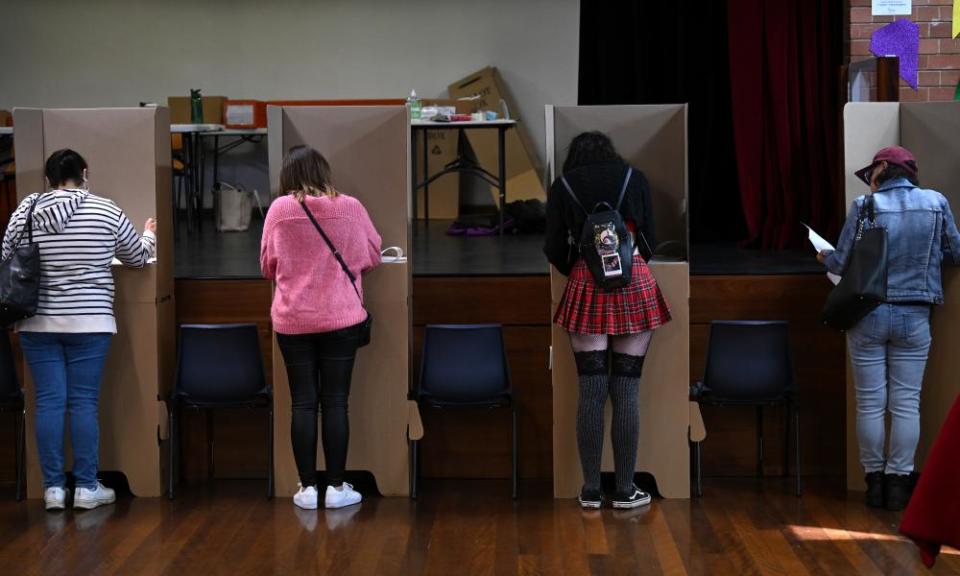Teal voters are more likely to be Labor-leaning than conservative, study finds

Fewer than one in five teal independent voters were disaffected Coalition voters, with most identifying as far to the political left as Labor voters regard themselves, a major study has found.
Scott Morrison was also judged to be the most unpopular party leader since the study began in 1987, with voters turning against the Liberal party over its handling of the economy, the pandemic response and Morrison’s leadership.
The Australian National University’s 2022 Australian Election Study, the most comprehensive of its kind, noted voters reported “the most pessimistic view of a government’s economic management, including the cost of living, in 30 years”.
It also found that voters engaged in “tactical voting” at rates that far exceed international studies.
Morrison’s popularity confirmed preliminary findings that he and Barnaby Joyce were the most unpopular party leaders in 35 years, with Morrison scoring just 3.8 on a scale of 0 to 10, after rating 5.1 in 2019. Joyce was even lower at 3.2.
The study authors noted that taken together, the findings represent “a serious existential crisis” for the Liberal party, with younger voters from millennials down turning their back on the now-opposition.
“Younger generations have very different voting patterns to previous generations at the same stage of the life cycle and are much further to the left in their party preferences,” said one of the study’s co-authors, Prof Simon Jackman, from the University of Sydney.
The 2022 election saw Labor, under Anthony Albanese, win a slim majority of 77 seats with a record low primary of almost 33%, while the Coalition shrank to just 58 seats, losing 10 seats to Labor, three to the Greens and six to teal independents in ordinarily safe blue-ribbon seats.
The study noted the Coalition’s losses to Greens and independents resulted in a “more proportional” outcome, receiving 36% of the first preference votes and 38% of the seats.
Related: Scott Morrison and Barnaby Joyce were most unpopular leaders at election since 1987, study shows
Another study co-author, Prof Ian McAllister, from ANU, said there was a “large-scale abandonment” of major political parties at the 2022 federal election, with the two-party vote falling to “historic lows”.
The study noted that the conditions leading to the independents’ breakthrough had been building for decades, with the proportion of “rusted-on” voters who always vote for the same party shrinking from 72% in 1967 to a “record low” of 37% in 2022.
The study found that among supporters of teal independents, 31% voted Labor in 2019, 24% for the Greens and only 18% voted Liberal.
“By far the largest group are tactical voters who see their preferred party as nonviable in the electorate and use this information to defeat the most viable party – the Liberals,” it said.
Asked to rate themselves on zero to 10 on a left-right scale, Coalition voters put themselves on the political right with an average score of 6.7, while Greens were on the left with an average of 3.
“Teal voters are almost the same as Labor voters in their ideological position with a mean of 4.4 compared to Labor voters’ mean of 4.3,” it said.
“Perhaps more importantly, teal voters are more likely to see the Liberal Party as further to the right than any other party group, except for Greens voters.
“For example, Labor voters place the Liberals at 6.6 on the scale, compared to 7.1 for teal voters. These findings counter the narrative of Teal voters as disaffected Liberals, showing that for the most part, they see themselves as left-of-centre.”
The Coalition also failed to win back female voters, with just 32% of women voting for the then government, the lowest share in the study’s history, which the authors traced back to the Coalition’s treatment of women within the party.
Rated on a 10-point scale, Albanese was the most popular leader in 2022, with an average evaluation of 5.3, followed by the Greens leader, Adam Bandt, on 4.1.
The study provides new insight into the qualities that voters preferred in Albanese, with strong leads over Morrison on compassion (+39% to Albanese), honesty (+29%) and trustworthiness (28%).
A study co-author, Dr Sarah Cameron, from Griffith University, said “voter disenchantment with the major political parties alone is not enough to see a change in outcomes, there also needs to be a viable alternative for these disenchanted voters to support”.
The teals benefited from voters’ disenchantment with the Coalition and Morrison, while running “well-funded, well-organised campaigns that were widely covered in the media”, Cameron said.

 Yahoo News
Yahoo News 